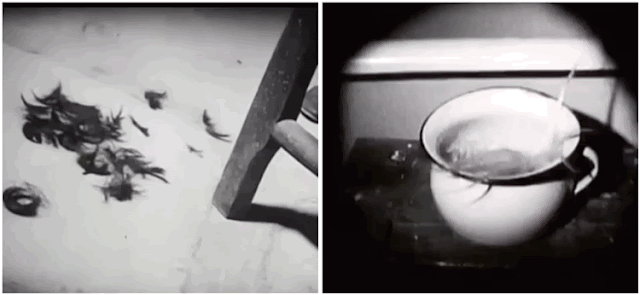 |
Vampyr /
Copenhagen Cowboy |
Putting aside the obvious (and sometimes tired) modern visual references often associated with Nicolas Winding Refn (Mann, Friedkin, Argento, Refn himself or any filmmaker that’s utilized a neon light or synthesizer), I noticed a handful of slightly deeper visual references in his latest project;
Copenhagen Cowboy.I’ll be going back to watch the series again and will update this post accordingly. But in the meantime please scroll through the first wave of comparisons I came up with along with various interview excerpts from over the years to add some context and/connective tissue.
I’m not a film analyst but most of the things we do nowadays, also in advertising, lead back to Kenneth Anger’s work - Nicolas Winding Refn, Indiewire
 |
Lucifer Rising /
Copenhagen Cowboy |
 |
Scorpio Rising /
Copenhagen Cowboy
|
Vampyr has always reminded me of a mysterious dream I once had when I was very little. The film has always stayed with me. I watch it before I make every film - Nicolas Winding Refn, Criterion
 |
Vampyr /
Copenhagen Cowboy |
 |
Vampyr /
Copenhagen Cowboy |
I offered to read the tarot for him [REFN] and from then on he had me read his tarot every time he made a new movie - Alejandro Jodorowsky, Vulture
 |
Holy Mountain /
Copenhagen Cowboy |
 |
Holy Mountain /
Copenhagen Cowboy
|
Unique, brilliant, fantastic! I love this movie! - Nicolas Winding Refn on Tokyo Drifter, Criterion
 |
Tokyo Drifter /
Copenhagen Cowboy
|
 |
Tokyo Drifter /
Copenhagen Cowboy
|
 |
Tokyo Drifter / Copenhagen Cowboy
|
 |
Tokyo Drifter /
Copenhagen Cowboy
 | Tokyo Drifter /
Copenhagen Cowboy
|
|
For me, Night of the Hunter has always been one of the greatest horror film titles. It is truly a very frightening fairy-tale - Nicolas Winding Refn, Moviemaker Magazine
 |
Night Of The Hunter /
Copenhagen Cowboy |
film is such an early medium in a way. You know what I mean? If you go through the history of painters, you can always say that somebody was inspired by someone to do that or to do this, and of course, it's the same thing with film. Every art form is an exchange to someone else, whether it's generational, whether it's of an experience, of an opportunity - Nicolas Winding Refn on influence of David Lynch, nrftsjournal
 |
Lost Highway /
Copenhagen Cowboy |
 |
Lost Highway /
Copenhagen Cowboy |
 |
Lost Highway /
Copenhagen Cowboy |
He [Terrence Fisher] was a very interesting film director and I think very much undervalued - Nicolas Winding Refn, mubi
 |
Flesh For Frankenstein /
Copenhagen Cowboy |
Seeing The Shining is like watching a painting of pure terror. It has no purpose, sexuality or function other than to completely terrorize you - Nicolas Winding Refn, Moviemaker Magazine
 |
The Shining /
Copenhagen Cowboy
|
 |
The Shining /
Copenhagen Cowboy |
Flesh For Frankenstein is the only film I’ve ever wished that I had made - Nicolas Winding Refn, Criterion
 |
Flesh For Frankenstein /
Copenhagen Cowboy |
He [Terrence Fisher] was a very interesting film director and I think very much undervalued - Nicolas Winding Refn, mubi
 |
The Curse Of Frankenstein /
Copenhagen Cowboy |
 |
The Curse Of Frankenstein /
Copenhagen Cowboy |
This is Suzuki at his most extreme — the flabbergasting pinnacle of his sixties pop-art aesthetic - Nicolas Winding Refn, indiewire
 |
Branded To Kill /
Copenhagen Cowboy |
the ultimate cocaine movie - Nicolas Winding Refn, mubi.com
 |
Suspiria /
Copenhagen Cowboy |















.gif)

.gif)
































